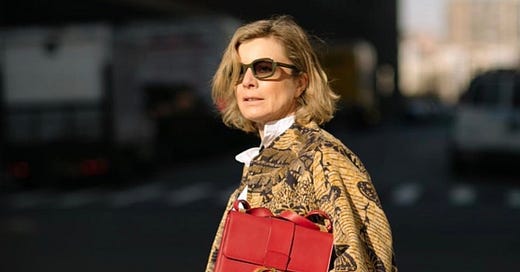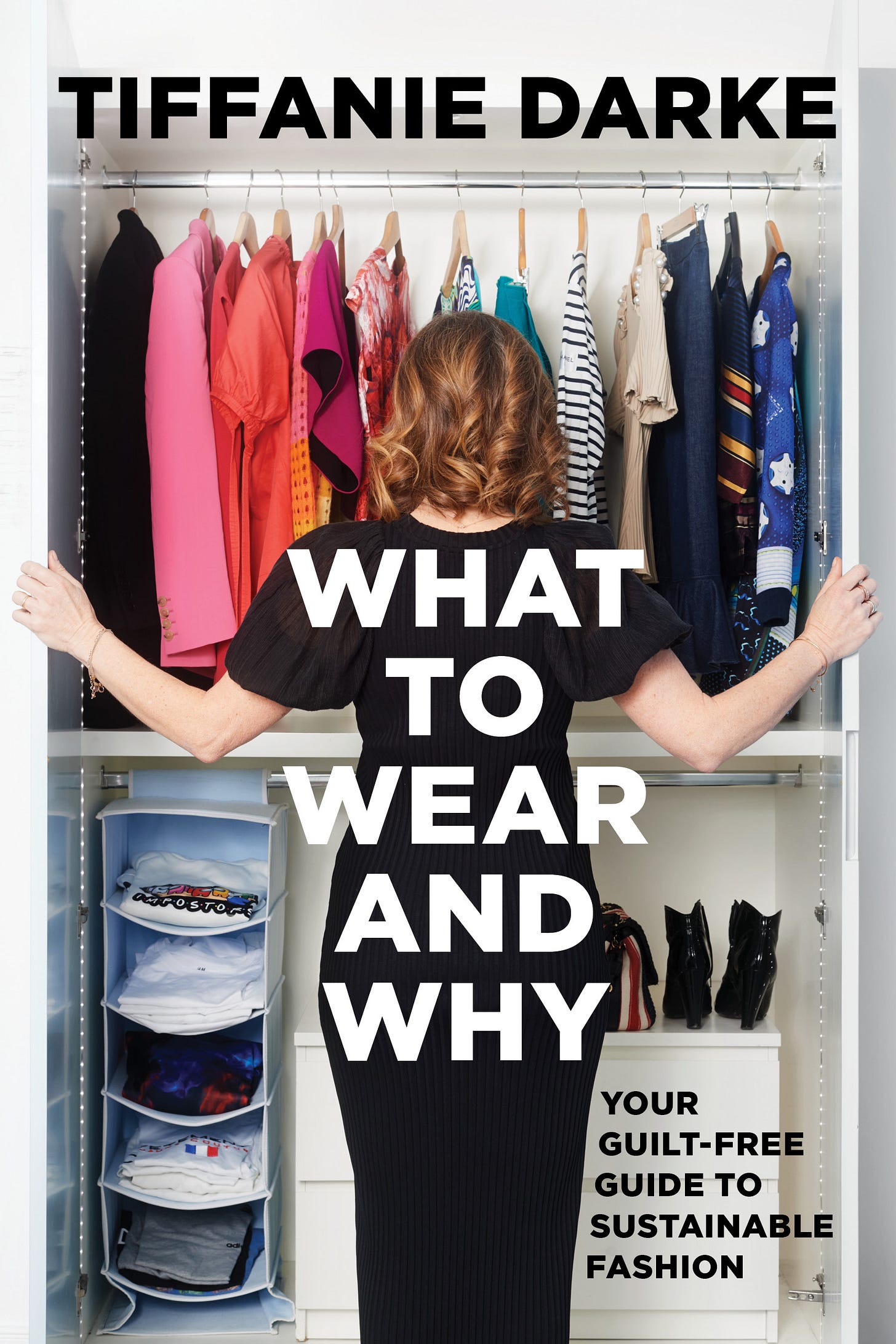Owning it with Tiffanie Darke, author, editor, retailer and advocate
In one of the best career pivots there is, I sat down with Tiffanie Darke to hear how she went from driving fashion consumption to asking us all to slow down.
I first knew of Tiffanie Darke when she was the force behind Sunday Times Style - a true fashion editor OG - but it wasn’t until recent times that our paths actually crossed. Once Tiffanie stepped into the world of sustainability, there was of course no going back. Fortunately for us, she’s quickly become a powerhouse on the topic.
Her career also spans being the editor-in-chief of luxury British department store Harrods, before she co-founded AGORA, a destination luxury and sustainability boutique at Six Senses Ibiza, (which was recently featured on the BBC, no less). She’s also the interim CEO for UK charity Smart Works, writes a Substack called It’s Not Sustainable, and runs the Rule of 5 campaign encouraging all of us to only buy five items of fashion each year based on the science telling us this is necessary. (Here’s my experience of participating in the campaign last year).
If that wasn’t enough, as an advocate for the power of fashion to be a force for good, Tiffanie has just published her first book What to Wear and Why: Your Guilt Free Guide to Sustainable Fashion in the US.
Here, she shares her insights on what pivoting a career in this industry looks like, and why sustainable fashion offers such a supportive community…
1. How does a fashion editor end up in the world of sustainability - what brought you here and why?
TD: I ended up at Harrods as editor-in-chief when the pandemic kicked in. All of a sudden my world went from magazines, in-store TV, podcasts, social media and e-commerce to... sending WhatsApp pictures of Louis Vuitton handbags to UHNW [ultra high net worth] clients on their luxury yachts. I was taking iPhone snaps of outrageously priced fripperies in a dark and eerie department store for the super rich to mindlessly acquire, then cycling home across lockdown London to bang saucepans on the doorstep for the nurses with my kids. Suddenly, my world didn’t make sense anymore. I realised I needed to educate myself, so I went back to school (the excellent Cambridge Institute for Sustainability Leadership) and learned about what was really going on.
2. What part of your background (and wider experience) do you feel brings value to the sustainability side of this industry?
TD: I am here for the customer, the consumer, the citizen. All my journalistic career I've broken down complex issues and stories in a way that people are most likely to engage with them, and this is my skill set. I do not believe I can change the behaviour of my audience by frightening them with emissions and impact stats. But I do believe I can inspire them with the stories of those who are doing good in the world, and making beautiful things in ways that benefit people and planet.
3. What is your typical day or week like these days?
TD: Monday to Friday 9am-5pm I am running Smart Works, the UK charity that dresses and coaches women into employment. It’s growing at the moment, really in scale up mode, so equipping teams with everything they need on the available budget is the challenge. The joy is meeting the clients who walk through our doors every day, whose lives we really help transform. 63% of our clients find employment within a month of using our service, and this helps them gain the agency over their own lives that we all need as a first step. Our clients come from very vulnerable circumstances - they can also be women who have been out of work for a long time, perhaps in caring roles, who are now ready to look for employment. It's an incredibly rewarding job. At night, I write, and at weekends, I pop over to Ibiza. Busy, but what a life.
4. You have just launched a book, can you tell us about it as well as what the experience of writing it was like?
TD: Luckily, I love writing. I've done it all my life and I find it comes quickly and easily to me (practice). I enjoy the subject, as the fashion and sustainability world is packed with incredible stories. The book is a primer for those looking to dress in a more responsible way, and also just understand the foundations of what a good supply chain, a responsible business model and an innovative material looks like. Plus lots of tips and tricks on getting by with less. Because... we can only afford to buy five new things a year.
5. What do you feel is the most challenging thing specifically about your work in sustainability within fashion today?
TD: Only buying 5 things a year! It was fun in year one and I learned all sorts of upcycling, swapping and renting tricks. Year two - I have less time to focus on the creative upcycling and would dearly love a shopping swoop. I have hugely enjoyed my purchases so far however, as they have been so highly anticipated and valued - a Mother of Pearl suit, a Margaret Howell blazer and a pair of bright red Rothys mary janes.
6. What one thing would you want to change in order to be able to do your job contributing towards sustainable fashion better?
I'd like not to do it all. I'd like legislation to come in and change this whole damn system so we can stop worrying about waste, pollution and toxicity, and set about healing the planet from the damage we have already done.
7. What advice do you have for others in sustainability that you wish you had been told?
That everyone is incredibly supportive, that it is a community of people who want you to succeed, that we will all help each other and you will meet some fabulous and inspiring people. If I'd known that I would have started a lot sooner!
Follow Tiffanie on Substack here, and order her book in the US here.








Such a great interview! Totally agree about regulation being needed to drive change.
I completely agree that we need more stick action with regulations, the carrot just hasn’t worked ! I also agree with fact that the world of sustainability is full of so many supportive collaborative people it’s really very refreshing.